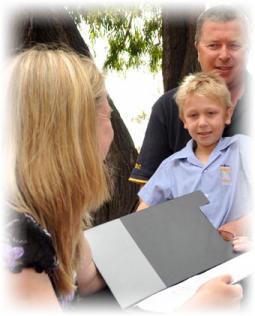I decided to begin communicating through online technologies like wikis and email because it was less intimidating than meeting the parents in person or speaking with them on the telephone. I discovered the advantages in using information and communication tools to start this dialogue with parents. I found that many parents would respond to my emails, and that we could have continuous communication. Eventually, I felt comfortable speaking with them face-to-face and realized how important it was to meet parents and communicate with them at the beginning.
In hindsight...if I had been communicating with my parents from the beginning, I could have avoided that painful scene altogether. Parents just want to be kept informed about their children, my students, and I had failed to do that as a new classroom teacher.
Below are a few tips to get you started working with parents from the beginning!
1) Begin on a Positive Note
Not only is it important to make the effort to communicate with parents at the very beginning, but also we should start with some positive news. Often, teachers only communicate with parents to deliver bad news. In the beginning, we find out about our learners, and it is easier to discover their talents then and share this information with parents. At the beginning of the year, I use a blanket email. I copy and paste the first two sentences and always say something along the lines of, "Dear Mr./Mrs. Doe, I really enjoyed meeting Johnny, who is very bright and makes me laugh at his funny jokes." I then add a personalized sentence or two about each child, making sure that it's positive.
This way, your first communication with the parent is positive versus negative. Include information and links to your wiki page and school website, your contact information, where they can find homework, your meeting hours, school supplies needed, and other important dates or information. At the end of the email, ask the parents to respond with answers to questions such as what is the best time to contact them and how they would like to help. If the parents have a question, they are more likely to respond back.
2) Ask Parents for Best Communication Method
Ask parents about the best way to communicate with them -- via e-mail, text messages, Twitter or letters sent home. I found that communicating digitally helped me manage my time and also develop relationships with the parents. It was easier and quicker to send an email or text message about all news concerning the students. Many parents will spend a lot of time working and may never have the chance to meet you face to face, but when you give them these communication options you can see how much they appreciate your flexibility.
3) Invite Parents to be a Part of the Team
Invite parents to participate in helping their children succeed. Ask what they think would make the curriculum better, and -- if the ideas are good -- try to implement the suggestion. In the past, I have had parents add wiki content such as song lyrics or YouTube videos. I have had parents suggest an activity for a book or a game. Invite parents to volunteer and help! I have had parents decorate the classroom. I have had parents gather and organize fundraisers to get computers or other needed items in the classroom. I gave them access to update our class' online calendar with their children's upcoming competitions or ceremonies so that as a class we can support each other. I have put parents in charge of the activity of the month or resource of the month on the wiki page or our online community. Parents have organized field trips or have been guest speakers. Remember... just like students, parents need to feel valued.
4) Do Workshops with Parents
Invite parents in! Introduce them to your curriculum by hosting a workshop and serving food! Food entices people to come. I like to host workshops after the first few weeks in order to go over what technology we will use in the classroom, games we will play, class rules and more. I talk to parents about their concerns, and we are able to share a great dialogue. You can also ask to video record the parent workshop and then send it to those who were not able to come, so they can have access to the content.
Shelly Sanchez Terrell
.edutopia.org



